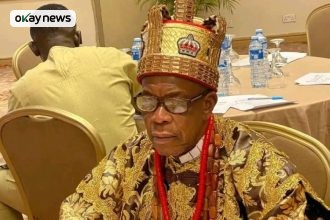The family of the detained leader of the Indigenous People of Biafra, Nnamdi Kanu, has openly disagreed with the recent judgment delivered by Justice James Omotosho of the Federal High Court in Abuja. In a detailed statement signed by Emmanuel Kanu on behalf of the Okwu Kanu family, they said they were responding to the ruling “with heavy hearts but absolute clarity,” stressing that the judgment raised multiple legal and constitutional issues.
According to the family, several arguments were presented before the court, including references to Section 36 Subsection 12 of the Constitution of the Federal Republic of Nigeria, judicial pronouncements from the Supreme Court of Nigeria on repealed laws, and earlier directives relating to previously withdrawn charges. Okay News reports that the family insisted these issues should have guided the ruling more decisively.
The statement underscored the constitutional provision which states, “No person shall be convicted unless the offence is defined in a written law in force at the time,” insisting that this principle is reinforced by past Supreme Court decisions. The family argued that any interpretation that fails to uphold this principle undermines the constitutional safeguard against convictions under laws that are no longer valid or that never properly existed at the time of the alleged offence.
Speaking on the legal reasoning applied, the family voiced concern about the court’s reliance on transition or savings clauses. They stated that such clauses were not applicable in this situation because, in their words, “Mazi Nnamdi Kanu’s matter was not pending.” They explained that the Court of Appeal had previously discharged and acquitted Kanu, thereby terminating all prior charges.
The family maintained that the charges brought before Justice Omotosho were entirely fresh and therefore constituted “a new case, commencing de novo.” They argued strongly that “a case that was terminated cannot be ‘saved’ by a transition clause,” insisting that any attempt to revive an already extinguished matter contradicts constitutional protections.
They further highlighted essential rights guaranteed under Section 36 of the Constitution, which include the right to be tried only under laws currently in force, the right to be informed of precise charges, and the right not to be convicted under repealed or nonexistent laws. These, they stressed, are rights that “cannot be overridden.”
On the question of legal hierarchy, the family stated clearly that “No transition clause can override Section 36. No statute can override the Constitution. No judge can override the Supreme Court.” They concluded by calling for strict adherence to constitutional procedures, insisting that “all proceedings should align with existing laws and procedures.”
The Federal High Court in Abuja had earlier sentenced Nnamdi Kanu to life imprisonment after convicting him on all seven counts of terrorism-related offences. Justice Omotosho imposed life imprisonment on counts one, two, four, five and six, instead of the death sentence. Count three attracted a twenty-year term with no option of fine, while count seven resulted in a five-year term also without any option of fine.







